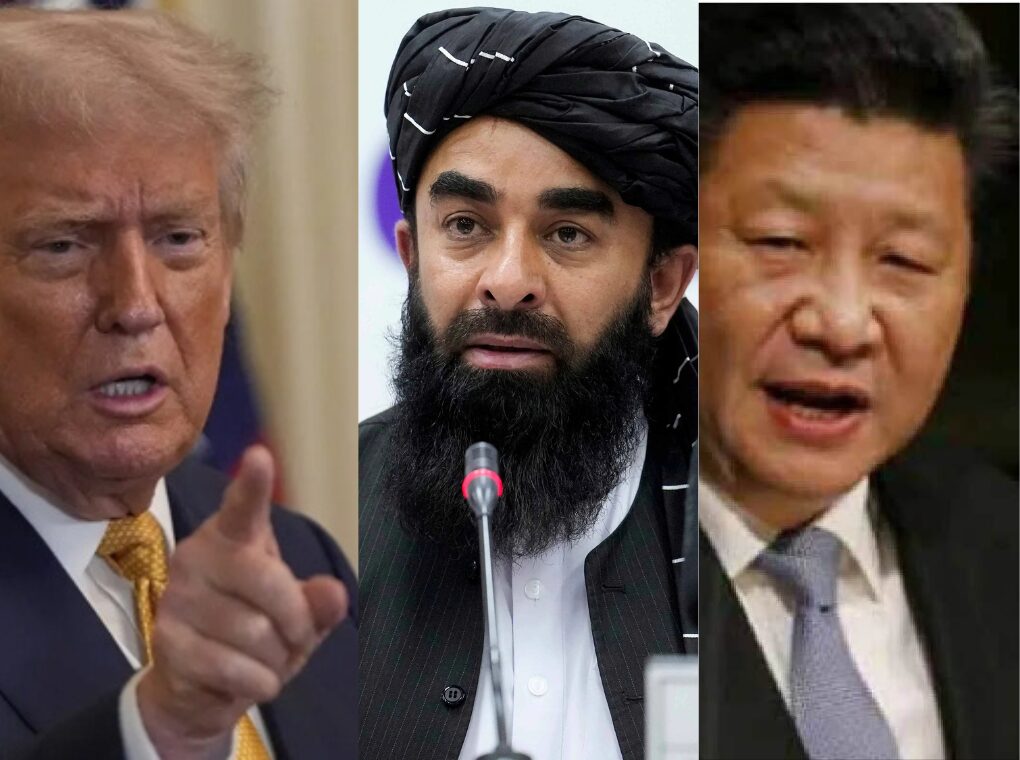U.S. President Donald Trump has reignited debate over Afghanistan’s Bagram Air Base, demanding that Kabul hand over control of the former American stronghold abandoned during the 2021 withdrawal. The Taliban government has flatly refused, with China publicly supporting Afghanistan’s sovereignty, setting the stage for a new geopolitical confrontation.
Trump’s Warning
Speaking alongside UK Prime Minister Keir Starmer during a state visit, Trump declared, “We’re trying to get it back. We want Bagram back, and we want it back soon.”
On Truth Social, he issued a blunt warning: “If Afghanistan doesn’t give Bagram Airbase back to those that built it, the United States of America, BAD THINGS ARE GOING TO HAPPEN!!!”
The U.S. president has repeatedly criticized his predecessor Joe Biden’s withdrawal as a “total disaster” and insists that Washington should never have given up the strategic base.
Why Bagram Matters?
Located 60 kilometers north of Kabul, Bagram was the largest U.S. facility in Afghanistan. During the height of the war in 2012, more than 100,000 American troops passed through its gates. The base featured two long runways, fortified shelters, hospitals, fuel depots, and even fast-food outlets for troops.
Strategically, its location is crucial. Sitting at the crossroads of Iran, Pakistan, Central Asia, and China’s Xinjiang province, Bagram offered a unique vantage point for U.S. intelligence operations across Eurasia. Trump emphasized its proximity to China, saying: “It’s an hour away from where China makes its nuclear weapons.”
The China Factor
The Pentagon estimates that China possesses over 600 operational nuclear warheads, with projections to exceed 1,000 by 2030. Analysts note that Bagram lies less than 1,500 miles from China’s Hami missile field in Xinjiang.
China, however, swiftly dismissed Trump’s remarks. Foreign Ministry spokesperson Lin Jian said Beijing “respects Afghanistan’s independence, sovereignty, and territorial integrity,” warning Washington against “stirring up tensions.”
Counterterrorism Argument
Bagram also served as the launchpad for U.S. operations against Al Qaeda, ISIS-K, and the Pakistani Taliban. According to a 2025 UN report, ISIS-K remains among the most dangerous extremist groups in the region, while Al Qaeda operates nine training camps inside Afghanistan.
Trump argues that regaining the base would restore America’s ability to strike at such groups.
Taliban’s Firm Rejection
Afghanistan’s Taliban government has rejected Washington’s demand in uncompromising terms.
Chief of Staff Fasihuddin Fitrat declared, “Afghanistan is fully independent, governed by its own people, and not dependent on any foreign power. We do not fear any bully or aggressor.”
Foreign Minister Amir Khan Muttaqi added: “Not even one metre of Afghan land will be given to the Americans.”
Defence Minister Mohammad Yaqoob Mujahid reminded that the Taliban had already refused U.S. requests to retain Bagram before the 2021 withdrawal. “Our answer was clear: if you don’t leave and want bases, we are ready to fight you for another 20 years.”
Experts See Move As Unrealistic
Analysts warn that any U.S. attempt to reoccupy Bagram would face fierce resistance and risk destabilizing the wider region.
Bill Roggio of the Foundation for Defense of Democracies said, “The Taliban and China would both resist a U.S. return. It would break the Doha Agreement, strain relations with Pakistan, and risk confrontation with Russia and Iran.”
Others point out that Trump’s claim that the U.S. “built” Bagram is misleading. The air base was originally constructed by the Soviet Union in the 1950s, redeveloped by American and NATO forces only after 2001.
Afghan analyst Idris Mohammadi Zazi described Trump’s demand as an “information campaign against Afghanistan,” while Chinese scholars argue it reflects Trump’s push to project toughness in foreign policy.
A Symbol of Past Wars
Bagram Air Base has a long and contested history. Built during the Cold War with Soviet support, it became Moscow’s hub during the 1979–89 occupation of Afghanistan. After years of civil war, it was transformed by the U.S. into a sprawling military city after the 2001 invasion.
For nearly two decades, it symbolized America’s war in Afghanistan—until the chaotic U.S. withdrawal in August 2021.
What Next?
Trump has not clarified whether he would consider deploying U.S. troops to forcibly retake the base. “We won’t talk about that,” he told reporters.
For now, Kabul remains firm in its rejection, Beijing has backed Afghanistan, and experts call the idea impractical. Yet, Trump’s demand has reopened debates about America’s legacy in Afghanistan, its rivalry with China, and the strategic value of one of the world’s most contested air bases.
